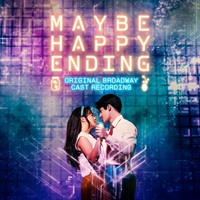 Original Broadway Cast, 2025 (Ghostlight)
Original Broadway Cast, 2025 (Ghostlight)  (4.5 / 5) While Maybe Happy Ending’s story revolves around two humanoids known as Helperbots, the score is anything but robotic. In fact, the music by Will Aronson is decidedly passionate. Aronson uses light jazz melodies, paired with Hue Park’s simple and effective lyrics, to create a beautifully melancholy mood. With a book by Aronson and Park, this musical centers around Oliver and Claire, who are being stored in separate rooms in a retirement home for older Helperbot models. We first meet Oliver (played by Darren Criss) in the song “The World Within My Room,” as he moves through his daily routine in his solitary space with only his plant, named Hwaboon, for companionship, plus plenty of jazz records and magazines on hand for listening and reading. (Oliver’s erstwhile owner, James, loved that genre of music). The jazz songs featured on the records that Oliver plays are primarily sung by cast member Dez Duron, who croons pleasantly throughout the album. Claire, played by Helen J Shen, is a newer, more human-like model of Helperbot, though still considered obsolete. She intrudes on Oliver’s solitude one day when she knocks on his door asking to borrow his charger, and soon, the two of them decide to journey out of their storage center and see the world — Oliver hoping to find his onetime owner, James, Claire wanting to see fireflies for the first time. Criss plays Oliver with a stubborn optimism, and his singing is perfectly suited for the score. Shen gets more feisty character moments, but she also shows a sensitive side when she sings about loss in “What I Learned From People.” The pair’s quirky charm is captured wonderfully in the duet “The Rainy Day We Met,” in which they create a fictional, romantic backstory for themselves in case they are questioned on their adventure. The instrumentals in Maybe Happy Ending should also be mentioned, as they make for some of the most effective tracks on the album. “Why Love” is a melody repeated throughout the score, but it never sounds sweeter than when arranged for solo piano, and one can almost see the magic of the fireflies during the orchestral piece “Chasing Fireflies.” The concept of this show, the cast, and the music all combine to tell a moving story of love, loss, and — most surprisingly — mortality. — Forrest Hutchinson
(4.5 / 5) While Maybe Happy Ending’s story revolves around two humanoids known as Helperbots, the score is anything but robotic. In fact, the music by Will Aronson is decidedly passionate. Aronson uses light jazz melodies, paired with Hue Park’s simple and effective lyrics, to create a beautifully melancholy mood. With a book by Aronson and Park, this musical centers around Oliver and Claire, who are being stored in separate rooms in a retirement home for older Helperbot models. We first meet Oliver (played by Darren Criss) in the song “The World Within My Room,” as he moves through his daily routine in his solitary space with only his plant, named Hwaboon, for companionship, plus plenty of jazz records and magazines on hand for listening and reading. (Oliver’s erstwhile owner, James, loved that genre of music). The jazz songs featured on the records that Oliver plays are primarily sung by cast member Dez Duron, who croons pleasantly throughout the album. Claire, played by Helen J Shen, is a newer, more human-like model of Helperbot, though still considered obsolete. She intrudes on Oliver’s solitude one day when she knocks on his door asking to borrow his charger, and soon, the two of them decide to journey out of their storage center and see the world — Oliver hoping to find his onetime owner, James, Claire wanting to see fireflies for the first time. Criss plays Oliver with a stubborn optimism, and his singing is perfectly suited for the score. Shen gets more feisty character moments, but she also shows a sensitive side when she sings about loss in “What I Learned From People.” The pair’s quirky charm is captured wonderfully in the duet “The Rainy Day We Met,” in which they create a fictional, romantic backstory for themselves in case they are questioned on their adventure. The instrumentals in Maybe Happy Ending should also be mentioned, as they make for some of the most effective tracks on the album. “Why Love” is a melody repeated throughout the score, but it never sounds sweeter than when arranged for solo piano, and one can almost see the magic of the fireflies during the orchestral piece “Chasing Fireflies.” The concept of this show, the cast, and the music all combine to tell a moving story of love, loss, and — most surprisingly — mortality. — Forrest Hutchinson
All posts by Michael Portantiere
Here Lies Love
 Studio Cast/Concept Album, 2010 (Nonesuch) No stars, not recommended. The controversial life of politician and former First Lady of the Philippines Imelda Marcos hardly seemed ripe for musical interpretation, and a disco opera detailing her rise to and fall from power seemed even more farfetched. But however unlikely, David Byrne (former lead singer for the band Talking Heads) and Fatboy Slim (musician and producer of electronic and indie rock music) collaborated to create Here Lies Love, originally presented to the world as a concept album that was released in 2010. The recording’s musical style is described by the writers as “disco club music,” a style chosen because of the real-life Imelda’s alleged fondness for it. The songs follow the central character and the woman who raised her, Estrella Cumpas, from Imelda’s upbringing as a poor girl to her rise as First Lady of the Philippines, continuing with her family’s forced evacuation from the country along with Ferdinand Marcos, her husband. (Marcos was controversial in his own right for the corruption, scandal, and human rights abuses that occurred during his time in office, from 1965 to 1986.) The album suffers from several issues that obscure the story the authors are attempting to tell. First, they can’t decide if Imelda Marcos is an ambitious, power-hungry temptress or merely an innocent pawn swept up in the political opportunity. And any attempt at storytelling is further marred by the plethora of pop artists enlisted to interpret the songs; the list of more than 20 singers on the album includes Florence Welch, Steve Earle, Cydni Lauper, Sia, and David Byrne himself. All of them perform competently, with Welch making the most of the maddeningly catchy title song, but each of the female artists portraying Imelda gives her a different characterization. The result is narrative whiplash — and that narrative is so loosely constructed that it’s impossible to discern who the characters are and what’s happening without consulting a plot summary. All told, this recording is an entertaining listen for curiosity’s sake, but it offers little value to fans of musical theater. — Forrest Hutchinson
Studio Cast/Concept Album, 2010 (Nonesuch) No stars, not recommended. The controversial life of politician and former First Lady of the Philippines Imelda Marcos hardly seemed ripe for musical interpretation, and a disco opera detailing her rise to and fall from power seemed even more farfetched. But however unlikely, David Byrne (former lead singer for the band Talking Heads) and Fatboy Slim (musician and producer of electronic and indie rock music) collaborated to create Here Lies Love, originally presented to the world as a concept album that was released in 2010. The recording’s musical style is described by the writers as “disco club music,” a style chosen because of the real-life Imelda’s alleged fondness for it. The songs follow the central character and the woman who raised her, Estrella Cumpas, from Imelda’s upbringing as a poor girl to her rise as First Lady of the Philippines, continuing with her family’s forced evacuation from the country along with Ferdinand Marcos, her husband. (Marcos was controversial in his own right for the corruption, scandal, and human rights abuses that occurred during his time in office, from 1965 to 1986.) The album suffers from several issues that obscure the story the authors are attempting to tell. First, they can’t decide if Imelda Marcos is an ambitious, power-hungry temptress or merely an innocent pawn swept up in the political opportunity. And any attempt at storytelling is further marred by the plethora of pop artists enlisted to interpret the songs; the list of more than 20 singers on the album includes Florence Welch, Steve Earle, Cydni Lauper, Sia, and David Byrne himself. All of them perform competently, with Welch making the most of the maddeningly catchy title song, but each of the female artists portraying Imelda gives her a different characterization. The result is narrative whiplash — and that narrative is so loosely constructed that it’s impossible to discern who the characters are and what’s happening without consulting a plot summary. All told, this recording is an entertaining listen for curiosity’s sake, but it offers little value to fans of musical theater. — Forrest Hutchinson
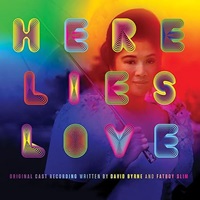 Original Off-Broadway Cast, 2013 (Nonesuch)
Original Off-Broadway Cast, 2013 (Nonesuch)  (1 / 5) It’s unfortunate that we have to judge the 2013 Off-Broadway production of Here Lies Love based solely on this audio recording, as the immersive presentation at The Public Theater was such a key part of its appeal. The show was sung-through, and some songs heard on the concept album were cut while others were added, to overall little effect. The cast album pulsates with synthesized beats, but similar to its predecessor, the songs become repetitive, without providing interesting lyrics or any understanding of the characters’ motives. Imelda is sung by the extremely talented Ruthie Ann Miles. She nails the title song, one of the many melodies that might get stuck in your head as you listen. Her voice cuts through the monotonous music, and though the role itself lacks depth, Miles is a consistently charismatic presence. Ferdinand Marcos is given an unremarkable performance by Jose Llana; surprisingly, Marcos is not the most prominently featured male character in the show; that would be Ninoy Aquino, a political reformer who had a relationship with Imelda when they were young, but who became one of the leading critics of the Marcos administration. (Think of Che in Evita.) Aquino is played by Conrad Ricamora, who gets to show off more emotional range than the others in songs such as “Child of the Philippines” and “Gate 37.” (This character largely replaces the role of the nanny, Estrella Cumpos on the concept album as a grounding presence in Imelda’s life and a reminder of her impoverished childhood.) The album is primarily an endless procession of funk music, interrupted briefly by the penultimate song, “God Draws Straight,” a soft melody accompanied by a single ukulele. The bulk of the score is better suited to a dance club setting than to close listening. If you can get your hands on a physical copy of the CD edition, it’s a colorful double-disc set that includes an 80 (!) page booklet with summaries for each track on the recording. Perhaps the feeling that it was necessary to include song summaries should be seen as an indication that prospective listeners may want to exercise caution. [Editor’s Note: A Broadway production of Here Lies Love, which attempted to recreate the immersive quality of the Off-Broadway presentation, opened in the summer of 2023. It ran for only 150 performances and three previews, and it yielded no cast album.] — F.H.
(1 / 5) It’s unfortunate that we have to judge the 2013 Off-Broadway production of Here Lies Love based solely on this audio recording, as the immersive presentation at The Public Theater was such a key part of its appeal. The show was sung-through, and some songs heard on the concept album were cut while others were added, to overall little effect. The cast album pulsates with synthesized beats, but similar to its predecessor, the songs become repetitive, without providing interesting lyrics or any understanding of the characters’ motives. Imelda is sung by the extremely talented Ruthie Ann Miles. She nails the title song, one of the many melodies that might get stuck in your head as you listen. Her voice cuts through the monotonous music, and though the role itself lacks depth, Miles is a consistently charismatic presence. Ferdinand Marcos is given an unremarkable performance by Jose Llana; surprisingly, Marcos is not the most prominently featured male character in the show; that would be Ninoy Aquino, a political reformer who had a relationship with Imelda when they were young, but who became one of the leading critics of the Marcos administration. (Think of Che in Evita.) Aquino is played by Conrad Ricamora, who gets to show off more emotional range than the others in songs such as “Child of the Philippines” and “Gate 37.” (This character largely replaces the role of the nanny, Estrella Cumpos on the concept album as a grounding presence in Imelda’s life and a reminder of her impoverished childhood.) The album is primarily an endless procession of funk music, interrupted briefly by the penultimate song, “God Draws Straight,” a soft melody accompanied by a single ukulele. The bulk of the score is better suited to a dance club setting than to close listening. If you can get your hands on a physical copy of the CD edition, it’s a colorful double-disc set that includes an 80 (!) page booklet with summaries for each track on the recording. Perhaps the feeling that it was necessary to include song summaries should be seen as an indication that prospective listeners may want to exercise caution. [Editor’s Note: A Broadway production of Here Lies Love, which attempted to recreate the immersive quality of the Off-Broadway presentation, opened in the summer of 2023. It ran for only 150 performances and three previews, and it yielded no cast album.] — F.H.
Hands on a Hardbody
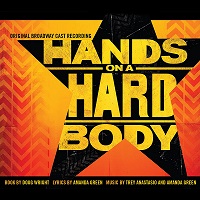 Original Broadway Cast, 2013 (Ghostlight)
Original Broadway Cast, 2013 (Ghostlight)  (3.5 / 5) With a score by Trey Anastasio and Amanda Green, and a book by Doug Wright, Hands on a Hardbody entertained audiences at the Brooks Atkinson Theater for only 28 performances in 2013, yet from the first twang on the cast album, we hear a distinctive blend of Country/Western music and bluesy rock. Based on a 1997 documentary that depicts a yearly competition in Texas wherein 24 contestants compete to win a truck by seeing who can keep a hand on the vehicle for the longest amount of time, the musical is a true ensemble piece; the cast of competitors includes Broadway favorite Hunter Foster alongside newcomer Keala Settle and TV, movie, and Broadway veteran Keith Carradine. Settle gives this album lots of gas, and she nearly stole the show onstage with her energetic gospel number, “Joy of the Lord.” Foster gets the 11 o’clock barn-burner “God Answered My Prayers,” and Carradine lends a gritty authenticity to his few vocal solos, especially the very touching “Used To Be.” The other contestants — played by Allison Case, Jay Armstrong Johnson, David Larsen, Jacob Ming-Trent, Kathleen Elizabeth Monteleone, Jon Rua, and Dale Soules — all get their moments to shine, following the tradition of such shows as A Chorus Line and Cats. Some listeners may pump the brakes when they hear the occasional use of slant rhymes (“Cassius/ashes,” “turnip/burn up”) in Green’s lyrics, and the recording does have quite a few clunkers and oddities; two examples are the finale, “Keep Your Hands On It,” which attempts sentimentality but with lyrics so bland that the song comes across as hokey, and “Uncontrollable Laughter,” in which we hear Settle’s religious-zealot character cackling for a full minute. But the better songs on this album are certainly worth sifting through the lesser ones, and the whole is greater than the sum of its parts. — Forrest Hutchinson
(3.5 / 5) With a score by Trey Anastasio and Amanda Green, and a book by Doug Wright, Hands on a Hardbody entertained audiences at the Brooks Atkinson Theater for only 28 performances in 2013, yet from the first twang on the cast album, we hear a distinctive blend of Country/Western music and bluesy rock. Based on a 1997 documentary that depicts a yearly competition in Texas wherein 24 contestants compete to win a truck by seeing who can keep a hand on the vehicle for the longest amount of time, the musical is a true ensemble piece; the cast of competitors includes Broadway favorite Hunter Foster alongside newcomer Keala Settle and TV, movie, and Broadway veteran Keith Carradine. Settle gives this album lots of gas, and she nearly stole the show onstage with her energetic gospel number, “Joy of the Lord.” Foster gets the 11 o’clock barn-burner “God Answered My Prayers,” and Carradine lends a gritty authenticity to his few vocal solos, especially the very touching “Used To Be.” The other contestants — played by Allison Case, Jay Armstrong Johnson, David Larsen, Jacob Ming-Trent, Kathleen Elizabeth Monteleone, Jon Rua, and Dale Soules — all get their moments to shine, following the tradition of such shows as A Chorus Line and Cats. Some listeners may pump the brakes when they hear the occasional use of slant rhymes (“Cassius/ashes,” “turnip/burn up”) in Green’s lyrics, and the recording does have quite a few clunkers and oddities; two examples are the finale, “Keep Your Hands On It,” which attempts sentimentality but with lyrics so bland that the song comes across as hokey, and “Uncontrollable Laughter,” in which we hear Settle’s religious-zealot character cackling for a full minute. But the better songs on this album are certainly worth sifting through the lesser ones, and the whole is greater than the sum of its parts. — Forrest Hutchinson
Honeymoon in Vegas
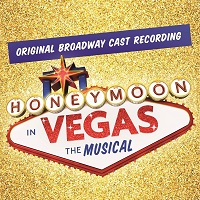 Original Broadway Cast, 2014 (Universal Music Enterprises)
Original Broadway Cast, 2014 (Universal Music Enterprises)  (2 / 5) The overture of Jason Robert Brown’s Honeymoon in Vegas tells us everything we need to know about the score: It’s full of showbiz razzmatazz, easy on the ears, yet overstuffed and largely generic. The opening number, “I Love Betsy,” is a list song that would’ve made Cole Porter proud, and has rightly become a beloved musical theater standard, but the score doesn’t have much farther to go. Given that the show’s story is deeply silly and farcical, the characters don’t have a lot to sing about, and Brown consistently stretches each emotion and musical moment to its fullest extent. As a result, even songs with clever ideas behind them, such as “Out of the Sun” (an ode to a wife who died from over-tanning) and “Airport Song” (a comic sequence about the difficulties of finding a flight) wear out their welcome. And though the snazzy, Vegas-style orchestrations by Don Sebesky serve the period nicely, they don’t do anything to help the sameness of the songs, especially when it comes to big group numbers. The show’s stars, Rob McClure and Brynn O’Malley, are charming, but neither of them are quite magnetic enough to sustain the piece as it starts to lag. Tony Danza is perfectly cast in the role of professional gambler Tommy Korman, and while he’s not a natural singer, he does have some great moments — one of them comes towards the end of the show, with “A Little Luck.” Featured performers including Nancy Opel and David Josefsberg do their best to sell their material, but there’s only so much you can do with tropes as tired as overbearing mothers and Elvis impersonators. Honeymoon in Vegas, true to its subject matter, may provide a nice vacation from the troubles of daily life, but since several other musical comedies exist that are far more intelligent about their silliness (Dirty Rotten Scoundrels, The Drowsy Chaperone, et al.), one couldn’t be blamed for deciding not to take this trip. — Charles Kirsch
(2 / 5) The overture of Jason Robert Brown’s Honeymoon in Vegas tells us everything we need to know about the score: It’s full of showbiz razzmatazz, easy on the ears, yet overstuffed and largely generic. The opening number, “I Love Betsy,” is a list song that would’ve made Cole Porter proud, and has rightly become a beloved musical theater standard, but the score doesn’t have much farther to go. Given that the show’s story is deeply silly and farcical, the characters don’t have a lot to sing about, and Brown consistently stretches each emotion and musical moment to its fullest extent. As a result, even songs with clever ideas behind them, such as “Out of the Sun” (an ode to a wife who died from over-tanning) and “Airport Song” (a comic sequence about the difficulties of finding a flight) wear out their welcome. And though the snazzy, Vegas-style orchestrations by Don Sebesky serve the period nicely, they don’t do anything to help the sameness of the songs, especially when it comes to big group numbers. The show’s stars, Rob McClure and Brynn O’Malley, are charming, but neither of them are quite magnetic enough to sustain the piece as it starts to lag. Tony Danza is perfectly cast in the role of professional gambler Tommy Korman, and while he’s not a natural singer, he does have some great moments — one of them comes towards the end of the show, with “A Little Luck.” Featured performers including Nancy Opel and David Josefsberg do their best to sell their material, but there’s only so much you can do with tropes as tired as overbearing mothers and Elvis impersonators. Honeymoon in Vegas, true to its subject matter, may provide a nice vacation from the troubles of daily life, but since several other musical comedies exist that are far more intelligent about their silliness (Dirty Rotten Scoundrels, The Drowsy Chaperone, et al.), one couldn’t be blamed for deciding not to take this trip. — Charles Kirsch
The Sabbath Girl
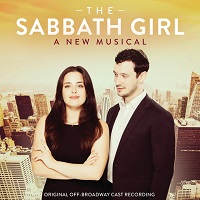 Original Off-Broadway Cast, 2024 (Center Stage Records)
Original Off-Broadway Cast, 2024 (Center Stage Records)  (3 / 5) Written by Neil Berg and Cary Gitter, this musical tells the story of an unlikely love match between Angie (Marilyn Caserta), an Italian-American art gallery owner, and her Orthodox Jewish neighbor, Seth (Max Wolkowitz), who works at a knish shop run by his sister (Lauren Singerman). Their romance is affected by the pressure Seth receives from his sister not to marry outside the faith, as well as by Marilyn’s on-and-off relationship with a hot artist named Blake (Rory Max Kaplan) and the advice she receives from her grandmother (Diana DiMarzio), whom we eventually learn in the show (but not on the album) is actually the spirit of Marilyn’s deceased relative. Caserta and Wolkowitz are undoubtedly rising stars, and both of them give rich vocal performances that make the listener feel invested in their relationship from the start, but the score does not quite live up to the quality of its performers. While Berg unquestionably knows how to write a soaring love song, there’s very little differentiation in style and tone throughout the score, with most of it oscillating between power ballads and light comic numbers. Two highlights of the album are “Listen to Your Heart,” a climactic quartet that almost but doesn’t quite get lost in a sea of 11 o’clock turns, and “The Knish Song,” notable for its specificity and humor. The lyrics, by Berg and Gitter, are generally charming, although they often deal in false rhymes and are not always well-served by the tempo of the accompanying music. Sadly, this show doesn’t avoid the trap of portraying Jewish characters as inherently anxious and neurotic, and the song “Off the Roof,” in which Angie teaches Seth to discard his troubles, is questionable in its use of stereotypes. As the initially engaging story winds down, it seems to run out of new complications, and listeners may find themselves drifting off towards the end of the album’s comparatively short running time. While The Sabbath Girl is unlikely to make much of a splash beyond its initial Off-Broadway production and this recording, it does have its pleasures. — Charles Kirsch
(3 / 5) Written by Neil Berg and Cary Gitter, this musical tells the story of an unlikely love match between Angie (Marilyn Caserta), an Italian-American art gallery owner, and her Orthodox Jewish neighbor, Seth (Max Wolkowitz), who works at a knish shop run by his sister (Lauren Singerman). Their romance is affected by the pressure Seth receives from his sister not to marry outside the faith, as well as by Marilyn’s on-and-off relationship with a hot artist named Blake (Rory Max Kaplan) and the advice she receives from her grandmother (Diana DiMarzio), whom we eventually learn in the show (but not on the album) is actually the spirit of Marilyn’s deceased relative. Caserta and Wolkowitz are undoubtedly rising stars, and both of them give rich vocal performances that make the listener feel invested in their relationship from the start, but the score does not quite live up to the quality of its performers. While Berg unquestionably knows how to write a soaring love song, there’s very little differentiation in style and tone throughout the score, with most of it oscillating between power ballads and light comic numbers. Two highlights of the album are “Listen to Your Heart,” a climactic quartet that almost but doesn’t quite get lost in a sea of 11 o’clock turns, and “The Knish Song,” notable for its specificity and humor. The lyrics, by Berg and Gitter, are generally charming, although they often deal in false rhymes and are not always well-served by the tempo of the accompanying music. Sadly, this show doesn’t avoid the trap of portraying Jewish characters as inherently anxious and neurotic, and the song “Off the Roof,” in which Angie teaches Seth to discard his troubles, is questionable in its use of stereotypes. As the initially engaging story winds down, it seems to run out of new complications, and listeners may find themselves drifting off towards the end of the album’s comparatively short running time. While The Sabbath Girl is unlikely to make much of a splash beyond its initial Off-Broadway production and this recording, it does have its pleasures. — Charles Kirsch
Far From Heaven
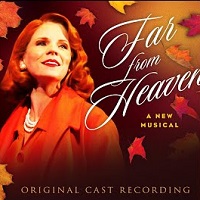 Original Off-Broadway Cast, 2013 (PS Classics)
Original Off-Broadway Cast, 2013 (PS Classics)  (3.5 / 5) Parts of Scott Frankel’s score for this musical, based on the 2002 film of the same title, are uncommonly intricate. The beginning of the album is especially worthy of close listening, as Frankel slowly introduces melodies that will return throughout the score in inventive ways. However, the quality of the songs levels off somewhere in the middle of the piece, and the show’s sentimentality can begin to grate on listeners. Michael Korie’s lyrics are appropriate, if undistinguished. The book, by Richard Greenberg, adheres closely to the plot of the movie and revolves around the central character: Cathy Whitaker (Kelli O’Hara), a housewife in 1950s Connecticut whose husband is a closeted gay man, played by Steven Pasquale. This secret, along with an unexpected relationship between Cathy and her Black gardener, Raymond (Isaiah Johnson), are the show’s two main sources of drama. O’Hara and Pasquale are vocally exquisite throughout the recording, but they feel a little hemmed-in by their roles. One might say that O’Hara’s deft navigation of “Autumn in Connecticut” and “Once Upon a Time” is better than these songs deserved, and while Pasquale is not given many opportunities to show off his powerful voice, his performance of “If It Hadn’t Been” is noteworthy for his emotional delivery as well as the song’s fascinating melody. Johnson’s recorded performance is less memorable; he duets well with O’Hara while giving his philosophy on gardening in “Sun and Shade,” and his character bonds with hers over a shared love of art in “Miró,” but his acting seems stilted on the album. One other cast member of note: Nancy Anderson stands out in the role of Cathy’s ever vigilant best friend, Eleanor, for her perfectly petty characterization. Far From Heaven had a promising run off-Broadway in 2013, but seems to have been largely forgotten since that production closed. — Forrest Hutchinson
(3.5 / 5) Parts of Scott Frankel’s score for this musical, based on the 2002 film of the same title, are uncommonly intricate. The beginning of the album is especially worthy of close listening, as Frankel slowly introduces melodies that will return throughout the score in inventive ways. However, the quality of the songs levels off somewhere in the middle of the piece, and the show’s sentimentality can begin to grate on listeners. Michael Korie’s lyrics are appropriate, if undistinguished. The book, by Richard Greenberg, adheres closely to the plot of the movie and revolves around the central character: Cathy Whitaker (Kelli O’Hara), a housewife in 1950s Connecticut whose husband is a closeted gay man, played by Steven Pasquale. This secret, along with an unexpected relationship between Cathy and her Black gardener, Raymond (Isaiah Johnson), are the show’s two main sources of drama. O’Hara and Pasquale are vocally exquisite throughout the recording, but they feel a little hemmed-in by their roles. One might say that O’Hara’s deft navigation of “Autumn in Connecticut” and “Once Upon a Time” is better than these songs deserved, and while Pasquale is not given many opportunities to show off his powerful voice, his performance of “If It Hadn’t Been” is noteworthy for his emotional delivery as well as the song’s fascinating melody. Johnson’s recorded performance is less memorable; he duets well with O’Hara while giving his philosophy on gardening in “Sun and Shade,” and his character bonds with hers over a shared love of art in “Miró,” but his acting seems stilted on the album. One other cast member of note: Nancy Anderson stands out in the role of Cathy’s ever vigilant best friend, Eleanor, for her perfectly petty characterization. Far From Heaven had a promising run off-Broadway in 2013, but seems to have been largely forgotten since that production closed. — Forrest Hutchinson
How to Dance in Ohio
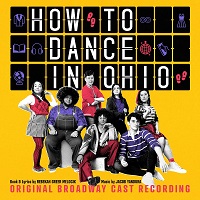 Original Broadway Cast, 2024 (Center Stage Records)
Original Broadway Cast, 2024 (Center Stage Records)  (2.5 / 5) It’s difficult to criticize the cast recording of a show that is so representative in its diversity and so bold in its subject matter. How to Dance in Ohio was powerful onstage, and also very meaningful to the autistic and neuro-divergent communities. It certainly deserves praise for its honest portrayal of a group of autistic young adults (played by autistic performers) who meet under the supervision of their counselor, Dr. Amigo. With a book and lyrics by Rebecca Greer Melocik, and music by Jacob Yandura, the show takes its title and general plot from a 2015 HBO documentary in which we see Dr. Amigo planning a formal dance to teach social skills to the group. Despite the obvious merits of the musical, the cast album rarely flows well, and unfortunately, the songs are musically undistinguished. “Today Is” proves to be a generic opening number, and though songs such as “Under Control,” “Unlikely Animals,” and “Waves and Wires” allow us to learn more about the inner minds of the characters, they don’t have memorable melodies. One thankful exception is a song performed by two mothers while preparing their daughters for the formal, “Getting Ready for the Dance.” (A heartbreaking sample of the lyrics: “So many things the other kids do, ours get ‘nevers,’ ‘nos,’ and ‘can’ts.’ I want a picture of my daughter getting ready for the dance.”) The ensemble cast members are universally laudable for their vulnerable performances on the album: Caesar Samayoa sounds uncannily similar to the real-life Dr. Amigo, Madison Kopec is just right as Marideth, and Liam Pierce as Drew highlights the recording with his 11 o’clock number, “Building Momentum.” — Forrest Hutchinson
(2.5 / 5) It’s difficult to criticize the cast recording of a show that is so representative in its diversity and so bold in its subject matter. How to Dance in Ohio was powerful onstage, and also very meaningful to the autistic and neuro-divergent communities. It certainly deserves praise for its honest portrayal of a group of autistic young adults (played by autistic performers) who meet under the supervision of their counselor, Dr. Amigo. With a book and lyrics by Rebecca Greer Melocik, and music by Jacob Yandura, the show takes its title and general plot from a 2015 HBO documentary in which we see Dr. Amigo planning a formal dance to teach social skills to the group. Despite the obvious merits of the musical, the cast album rarely flows well, and unfortunately, the songs are musically undistinguished. “Today Is” proves to be a generic opening number, and though songs such as “Under Control,” “Unlikely Animals,” and “Waves and Wires” allow us to learn more about the inner minds of the characters, they don’t have memorable melodies. One thankful exception is a song performed by two mothers while preparing their daughters for the formal, “Getting Ready for the Dance.” (A heartbreaking sample of the lyrics: “So many things the other kids do, ours get ‘nevers,’ ‘nos,’ and ‘can’ts.’ I want a picture of my daughter getting ready for the dance.”) The ensemble cast members are universally laudable for their vulnerable performances on the album: Caesar Samayoa sounds uncannily similar to the real-life Dr. Amigo, Madison Kopec is just right as Marideth, and Liam Pierce as Drew highlights the recording with his 11 o’clock number, “Building Momentum.” — Forrest Hutchinson
Doctor Zhivago
 Original Broadway Cast, 2011 (Broadway Records)
Original Broadway Cast, 2011 (Broadway Records)  (2 / 5) This recording reveals an uneven score for a musical with a rather complicated plot. The source material, Boris Pasternak’s 1957 novel of the same title, may be partially to blame; the story takes place during the Russian Revolution, and it surrounds protagonist Yuri Zhivago with numerous characters and a sprawling narrative. The short-lived Broadway production featured music by Lucy Simon, lyrics by Amy Powers and Michael Korie, and a book by Michael Weller. If one can listen beyond the muddled and unfocused opening number, “Two Worlds,” there are quite a few lovely songs in this score, primarily owing to Simon’s ability to craft beautiful duets; hear Zhivago (Tam Mutu) implore his wife (Lora Lee Gayer) to “Watch the Moon,” or listen to “Love Finds You,” a quintet that attempts to juggle all of the show’s prominent characters and their wandering hearts. There is charming vocal work done by Kelli Barrett, who’s given strong material as Zhivago’s lover, Lara, and Paul Alexander Nolan as Pasha Antipov/Strelnikov, who’s not so fortunate in that regard. The plot of Doctor Zhivago may be very difficult to follow, but when this recording reaches its climax with the conventional but effective duet “On the Edge of Time With You,” listeners may just be won over. — Forrest Hutchinson
(2 / 5) This recording reveals an uneven score for a musical with a rather complicated plot. The source material, Boris Pasternak’s 1957 novel of the same title, may be partially to blame; the story takes place during the Russian Revolution, and it surrounds protagonist Yuri Zhivago with numerous characters and a sprawling narrative. The short-lived Broadway production featured music by Lucy Simon, lyrics by Amy Powers and Michael Korie, and a book by Michael Weller. If one can listen beyond the muddled and unfocused opening number, “Two Worlds,” there are quite a few lovely songs in this score, primarily owing to Simon’s ability to craft beautiful duets; hear Zhivago (Tam Mutu) implore his wife (Lora Lee Gayer) to “Watch the Moon,” or listen to “Love Finds You,” a quintet that attempts to juggle all of the show’s prominent characters and their wandering hearts. There is charming vocal work done by Kelli Barrett, who’s given strong material as Zhivago’s lover, Lara, and Paul Alexander Nolan as Pasha Antipov/Strelnikov, who’s not so fortunate in that regard. The plot of Doctor Zhivago may be very difficult to follow, but when this recording reaches its climax with the conventional but effective duet “On the Edge of Time With You,” listeners may just be won over. — Forrest Hutchinson
Hell’s Kitchen
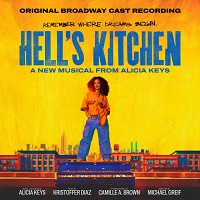 Original Broadway Cast, 2024 (Alicia Keys Records/Interscope)
Original Broadway Cast, 2024 (Alicia Keys Records/Interscope)  (4 / 5) Hell’s Kitchen is one jukebox musical — in this case, celebrating the artistry of R&B singer-songwriter Alicia Keys through the semi-autobiographical story of teenage rebel Ali (Maleah Joi Moon) — that receives a significant upgrade in the translation from stage to cast recording. On the one hand, the misguided inclusion here of substantial portions of dialogue gives us too much of the show’s paper-thin story and near non-existent character development. (The most frustrating track in this regard is “You Play These Notes” featuring a wildly silly and unconvincing piano pedagogy.) But also showcased are the extraordinary vocals and rousing arrangements of Keys’ songs that a shorter version of the album could have offered with fewer distractions. Rather than simply recreating the sound of Keys’ original hit recordings, Hell’s Kitchen reimagines them: the sped-up, jazzy take on “Fallin’” and the impassioned mother-daughter duet recrafting of “No One” are two exemplars. Keys penned four new songs, including the lovely “The River,” for the musical, but the bulk of the score consists of items familiar from nearly 25 years of her albums. As jukebox musicals go, this one boasts unusual orchestral reinvention; Tom Kitt and Adam Blackstone engage in symphonic spread with rich scoring for strings that never overwhelms the piano-driven gold at the core of Keys’ compositional mines. And there’s a generosity of spirit in Keys’ willingness to spread the wealth of her solo songbook to other vocal artists, an unselfishness rewarded by the four central performances well represented by numerous tracks on the album: the deliciously melismatic rasp of newcomer Moon’s “The River” and “Kaleidoscope,” the seductive syrup of Brandon Victor Dixon’s “Not Even the King” and “Fallin’,” the rafters-raising electricity of Shoshana Bean’s “Pawn It All” and “No One,” and, best of all, the richness and warmth of Kecia Lewis’ “Perfect Way to Die,” “Authors of Forever,” and “Like Water.” — Dan Rubins
(4 / 5) Hell’s Kitchen is one jukebox musical — in this case, celebrating the artistry of R&B singer-songwriter Alicia Keys through the semi-autobiographical story of teenage rebel Ali (Maleah Joi Moon) — that receives a significant upgrade in the translation from stage to cast recording. On the one hand, the misguided inclusion here of substantial portions of dialogue gives us too much of the show’s paper-thin story and near non-existent character development. (The most frustrating track in this regard is “You Play These Notes” featuring a wildly silly and unconvincing piano pedagogy.) But also showcased are the extraordinary vocals and rousing arrangements of Keys’ songs that a shorter version of the album could have offered with fewer distractions. Rather than simply recreating the sound of Keys’ original hit recordings, Hell’s Kitchen reimagines them: the sped-up, jazzy take on “Fallin’” and the impassioned mother-daughter duet recrafting of “No One” are two exemplars. Keys penned four new songs, including the lovely “The River,” for the musical, but the bulk of the score consists of items familiar from nearly 25 years of her albums. As jukebox musicals go, this one boasts unusual orchestral reinvention; Tom Kitt and Adam Blackstone engage in symphonic spread with rich scoring for strings that never overwhelms the piano-driven gold at the core of Keys’ compositional mines. And there’s a generosity of spirit in Keys’ willingness to spread the wealth of her solo songbook to other vocal artists, an unselfishness rewarded by the four central performances well represented by numerous tracks on the album: the deliciously melismatic rasp of newcomer Moon’s “The River” and “Kaleidoscope,” the seductive syrup of Brandon Victor Dixon’s “Not Even the King” and “Fallin’,” the rafters-raising electricity of Shoshana Bean’s “Pawn It All” and “No One,” and, best of all, the richness and warmth of Kecia Lewis’ “Perfect Way to Die,” “Authors of Forever,” and “Like Water.” — Dan Rubins
Bonnie and Clyde
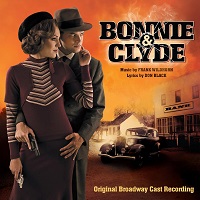 Original Broadway Cast, 2012 (Broadway Records)
Original Broadway Cast, 2012 (Broadway Records)  (1.5 / 5) This musical based on the real-life story of Bonnie Parker and Clyde Barrow, those infamous outlaws of the 1930s, has a book by Ivan Menchell, music by Frank Wildhorn, and lyrics by Don Black. The show opened on Broadway on December 1, 2011 and closed after only 36 performances. The cast recording starts out pleasantly by introducing us to Laura Osnes as Bonnie and Jeremy Jordan as Clyde. Jordan’s first song is a strong ballad, “The World Will Remember Me,” while Osnes croons a sweet-sounding ballad of her own, with the score’s catchiest tune: “How ’Bout a Dance.” Wildhorn has composed some praiseworthy music using jazz, blues, and gospel elements, but the score also includes several songs written in a nebulous pop style that makes no attempt to represent the time period. On the rare occasion when Wildhorn avoids the first-person ballad, we get misfires such as “God’s Arms Are Always Open,” a tonal mess in which the couple’s villainous deeds are underscored by a preacher’s fiery sermon. The song “Made in America” does delve into some of the deeper themes of the story and motivations of the characters, but it’s quickly followed and counteracted by multiple anemic ballads. Making matters worse, Black’s lyrics are bland and rarely more than skin-deep, resulting in stagnant songs that don’t push the story forward. Certain individual numbers might be enjoyable when extracted from the show; for example, Clyde’s love song, “Bonnie,” and Bonnie’s 11 o’clock number, “Dyin’ Ain’t So Bad” are particularly memorable and could perhaps serve as fine cabaret material. But listening to this album from start to finish may well prove to be an unsatisfying experience for those expecting a cohesive musical theatre score. The recording’s major recommendations are the performances of Osnes, Jordan, and Melissa Van Der Schyff a s Clyde’s long-suffering sister-in-law. All three are given ample opportunity to show off their vocal dexterity. — Forrest Hutchinson
(1.5 / 5) This musical based on the real-life story of Bonnie Parker and Clyde Barrow, those infamous outlaws of the 1930s, has a book by Ivan Menchell, music by Frank Wildhorn, and lyrics by Don Black. The show opened on Broadway on December 1, 2011 and closed after only 36 performances. The cast recording starts out pleasantly by introducing us to Laura Osnes as Bonnie and Jeremy Jordan as Clyde. Jordan’s first song is a strong ballad, “The World Will Remember Me,” while Osnes croons a sweet-sounding ballad of her own, with the score’s catchiest tune: “How ’Bout a Dance.” Wildhorn has composed some praiseworthy music using jazz, blues, and gospel elements, but the score also includes several songs written in a nebulous pop style that makes no attempt to represent the time period. On the rare occasion when Wildhorn avoids the first-person ballad, we get misfires such as “God’s Arms Are Always Open,” a tonal mess in which the couple’s villainous deeds are underscored by a preacher’s fiery sermon. The song “Made in America” does delve into some of the deeper themes of the story and motivations of the characters, but it’s quickly followed and counteracted by multiple anemic ballads. Making matters worse, Black’s lyrics are bland and rarely more than skin-deep, resulting in stagnant songs that don’t push the story forward. Certain individual numbers might be enjoyable when extracted from the show; for example, Clyde’s love song, “Bonnie,” and Bonnie’s 11 o’clock number, “Dyin’ Ain’t So Bad” are particularly memorable and could perhaps serve as fine cabaret material. But listening to this album from start to finish may well prove to be an unsatisfying experience for those expecting a cohesive musical theatre score. The recording’s major recommendations are the performances of Osnes, Jordan, and Melissa Van Der Schyff a s Clyde’s long-suffering sister-in-law. All three are given ample opportunity to show off their vocal dexterity. — Forrest Hutchinson
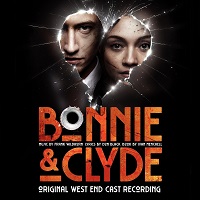 Original London Cast, 2023 (Broadway Records)
Original London Cast, 2023 (Broadway Records)  (2 / 5) While this recording does not reflect any major fix of the flaws in the original material, some of the wrinkles have been smoothed out. As was the case with the Broadway album, the cast is the most laudable element here. Frances Mayli McCann in the role of Bonnie is alluring as she belts through the Wildhorn ballads; her overall performance is equal in quality to that of Laura Osnes, with the exception of “Dyin’ Ain’t So Bad,” in which McCann doesn’t quite manage to match the excitement conjured up by that number on the previous recording. She is joined by Jordan Luke Gage, an appropriately youthful and unstable Clyde whose singing has an edge that truly fits the score and the character. All of the other soloists in featured roles sing well, but the score still largely fails to justify the existence of those characters as part of the story. The most noticeable difference between this recording and the Broadway original is the inclusion here of bits of the show’s dialogue, especially at the beginning. This was presumably intended to help bind the disjointed songs together, but unfortunately, the delivery of the dialogue only highlights the performers’ stilted attempts to take on American accents. The orchestrations have been altered slightly; for example, “Raise A Little Hell” is here drowned in electric guitar, and the rock-concert quality feels completely out of step with the rest of the score. It seems that, instead of making meaningful changes to the material, the creative team for this production simply leaned into the show’s pop style. On that note, an alternate version of “Dyin’ Ain’t So Bad” is included as a bonus track, arranged as a riff-filled duet for Bonnie and Clyde and sung by the show’s alternates, Barnie Wilkinson and Lauren Jones. — F.H.
(2 / 5) While this recording does not reflect any major fix of the flaws in the original material, some of the wrinkles have been smoothed out. As was the case with the Broadway album, the cast is the most laudable element here. Frances Mayli McCann in the role of Bonnie is alluring as she belts through the Wildhorn ballads; her overall performance is equal in quality to that of Laura Osnes, with the exception of “Dyin’ Ain’t So Bad,” in which McCann doesn’t quite manage to match the excitement conjured up by that number on the previous recording. She is joined by Jordan Luke Gage, an appropriately youthful and unstable Clyde whose singing has an edge that truly fits the score and the character. All of the other soloists in featured roles sing well, but the score still largely fails to justify the existence of those characters as part of the story. The most noticeable difference between this recording and the Broadway original is the inclusion here of bits of the show’s dialogue, especially at the beginning. This was presumably intended to help bind the disjointed songs together, but unfortunately, the delivery of the dialogue only highlights the performers’ stilted attempts to take on American accents. The orchestrations have been altered slightly; for example, “Raise A Little Hell” is here drowned in electric guitar, and the rock-concert quality feels completely out of step with the rest of the score. It seems that, instead of making meaningful changes to the material, the creative team for this production simply leaned into the show’s pop style. On that note, an alternate version of “Dyin’ Ain’t So Bad” is included as a bonus track, arranged as a riff-filled duet for Bonnie and Clyde and sung by the show’s alternates, Barnie Wilkinson and Lauren Jones. — F.H.
Water for Elephants
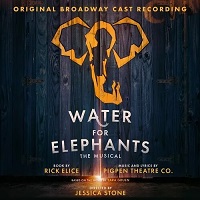 Original Broadway Cast, 2024 (Ghostlight)
Original Broadway Cast, 2024 (Ghostlight)  (2.5 / 5) Under the direction of Jessica Stone, Water for Elephants boasted an inventive set and a variety of entertaining circus acts on stage at the Imperial Theatre. The dazzling visuals were supported by music and lyrics from the seven-member band PigPen Theatre Co., which specializes in folk music, and this score leans heavily into that genre. The show’s book, written by Rick Elice, adheres closely to the 2006 novel of the same title by Sara Gruen. It presents a love triangle between the three main characters, and also largely concerns an elephant named Rosie, who can be heard briefly on the recording as well. The central character is Jacob Jankowski, played as an older man by Broadway veteran Gregg Edelman, who has sadly been handed the score’s duller songs. He sets the story in motion by recalling his time as a grieving young man who hitched a ride on a train with the Benzini Brothers Circus. Young Jacob is played by Grant Gustin in a performance that comes across as serviceable; his delivery sounds melodramatic in both the opening number, “Anywhere,” and the second act ballad “Go Home.” Throughout the show, Jacob frequently finds himself at odds with August Rackinger, the slick but cruel and murderous ring-leader of the circus, a role sung to villainous perfection by Paul Alexander Nolan. Although the cast album starts out slow, it’s jolted into focus by Nolan’s charismatic introduction of the circus: “The Lion Has Got No Teeth.” The triangle is completed by August’s wife, Marlena, played by Isabelle McCalla. Her seductively charming voice is featured in the song “Easy,” as she and Jacob work to tame Rosie, the circus’s newest addition. Jacob and Marlena develop feelings for each other while training Rosie to perform, leading to the show’s best number, a thrilling duet titled “Wild.” Gustin, Nolan, and McCalla are all compelling as the score builds to its climax in the confrontational “You’ve Got Nothing,” which proves that PigPen Theatre Co. can not only write great folk songs, but great theatre songs as well. Some of the tracks featuring the circus troupe — for example, “The Road Don’t Make You Young” and “Another Train” — are genuine knee-slappers as they blend a folk sensibility with theatricality in a very satisfying way. On the negative side, the show’s lyrics in general exhibit an over-reliance on slant rhymes, and superfluous songs such as “Funny Angel,” “Zostań,” and “Squeaky Wheel” don’t serve to move the plot forward or help us understand the characters. — Forrest Hutchinson
(2.5 / 5) Under the direction of Jessica Stone, Water for Elephants boasted an inventive set and a variety of entertaining circus acts on stage at the Imperial Theatre. The dazzling visuals were supported by music and lyrics from the seven-member band PigPen Theatre Co., which specializes in folk music, and this score leans heavily into that genre. The show’s book, written by Rick Elice, adheres closely to the 2006 novel of the same title by Sara Gruen. It presents a love triangle between the three main characters, and also largely concerns an elephant named Rosie, who can be heard briefly on the recording as well. The central character is Jacob Jankowski, played as an older man by Broadway veteran Gregg Edelman, who has sadly been handed the score’s duller songs. He sets the story in motion by recalling his time as a grieving young man who hitched a ride on a train with the Benzini Brothers Circus. Young Jacob is played by Grant Gustin in a performance that comes across as serviceable; his delivery sounds melodramatic in both the opening number, “Anywhere,” and the second act ballad “Go Home.” Throughout the show, Jacob frequently finds himself at odds with August Rackinger, the slick but cruel and murderous ring-leader of the circus, a role sung to villainous perfection by Paul Alexander Nolan. Although the cast album starts out slow, it’s jolted into focus by Nolan’s charismatic introduction of the circus: “The Lion Has Got No Teeth.” The triangle is completed by August’s wife, Marlena, played by Isabelle McCalla. Her seductively charming voice is featured in the song “Easy,” as she and Jacob work to tame Rosie, the circus’s newest addition. Jacob and Marlena develop feelings for each other while training Rosie to perform, leading to the show’s best number, a thrilling duet titled “Wild.” Gustin, Nolan, and McCalla are all compelling as the score builds to its climax in the confrontational “You’ve Got Nothing,” which proves that PigPen Theatre Co. can not only write great folk songs, but great theatre songs as well. Some of the tracks featuring the circus troupe — for example, “The Road Don’t Make You Young” and “Another Train” — are genuine knee-slappers as they blend a folk sensibility with theatricality in a very satisfying way. On the negative side, the show’s lyrics in general exhibit an over-reliance on slant rhymes, and superfluous songs such as “Funny Angel,” “Zostań,” and “Squeaky Wheel” don’t serve to move the plot forward or help us understand the characters. — Forrest Hutchinson
Stereophonic
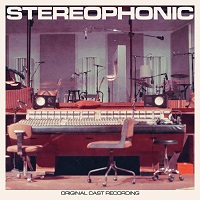 Original Broadway Cast, 2024 (Masterworks Broadway)
Original Broadway Cast, 2024 (Masterworks Broadway)  (4 / 5) At the end of the 2023-24 Broadway season, which saw the opening of 15 original musicals, Will Butler’s songs for the play Stereophonic earned one of the five coveted “Best Score” nominations for the Tony Awards. Judging from the cast recording, it’s not hard to see why. This score is not just a tribute to, but also a delightful riff on, Fleetwood Mac’s famous Rumors album, which was its inspiration. Butler’s work has the same tight instrumentation and vocal arrangements, with an added flair and inventive lyrics that beautifully complement David Adjmi’s play. The breakout star here is Sarah Pidgeon as Diana, shining in her first appearance on “Bright” and shattering the listener with her vulnerable performance of “East of Eden.” Pidgeon’s voice has extraordinary depth and color while being gloriously imperfect; she sings with skillful abandon, and even some (purposely) shaky notes from her have beauty and passion in them. Juliana Canfield as Holly is another very special talent, whose song “Drive” might be a breakout hit due to its polish and memorable melody. The inclusion of seemingly spontaneous ad-libs at the end of many of the songs on this recording make the listening experience more fun and establish the “band” as a tightly knit group. Their musical camaraderie is further demonstrated by their harmonies in the hypnotic “BVs.” The album’s only fault is its inclusion of some bits of music that don’t make an appearance in the show and feel like unnecessary additions. “Masquerade” and “Bright” are each presented more than once here: the former is driving and delightful in its first version, with a full orchestration, and pleasant if less exciting in its “campfire” version (lifted both times by Tom Pecinka’s gloriously husky vocals), while the latter is effective all three times, sparked by evocative lyrics and pulsing instrumentation. The success of this show may lead to more straight plays with substantial song scores, but be warned: Stereophonic has set an astronomically high bar in that regard. — Charles Kirsch
(4 / 5) At the end of the 2023-24 Broadway season, which saw the opening of 15 original musicals, Will Butler’s songs for the play Stereophonic earned one of the five coveted “Best Score” nominations for the Tony Awards. Judging from the cast recording, it’s not hard to see why. This score is not just a tribute to, but also a delightful riff on, Fleetwood Mac’s famous Rumors album, which was its inspiration. Butler’s work has the same tight instrumentation and vocal arrangements, with an added flair and inventive lyrics that beautifully complement David Adjmi’s play. The breakout star here is Sarah Pidgeon as Diana, shining in her first appearance on “Bright” and shattering the listener with her vulnerable performance of “East of Eden.” Pidgeon’s voice has extraordinary depth and color while being gloriously imperfect; she sings with skillful abandon, and even some (purposely) shaky notes from her have beauty and passion in them. Juliana Canfield as Holly is another very special talent, whose song “Drive” might be a breakout hit due to its polish and memorable melody. The inclusion of seemingly spontaneous ad-libs at the end of many of the songs on this recording make the listening experience more fun and establish the “band” as a tightly knit group. Their musical camaraderie is further demonstrated by their harmonies in the hypnotic “BVs.” The album’s only fault is its inclusion of some bits of music that don’t make an appearance in the show and feel like unnecessary additions. “Masquerade” and “Bright” are each presented more than once here: the former is driving and delightful in its first version, with a full orchestration, and pleasant if less exciting in its “campfire” version (lifted both times by Tom Pecinka’s gloriously husky vocals), while the latter is effective all three times, sparked by evocative lyrics and pulsing instrumentation. The success of this show may lead to more straight plays with substantial song scores, but be warned: Stereophonic has set an astronomically high bar in that regard. — Charles Kirsch
Teeth
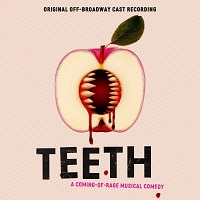 Original Off-Broadway Cast, 2024 (Yellow Sound Label)
Original Off-Broadway Cast, 2024 (Yellow Sound Label)  (4.5 / 5) Michael R. Jackson has quickly become the prince of telling unlikely stories on stage, so it shouldn’t be a surprise that his unlikeliest project yet is highly successful. Teeth, based on the cult classic film of the same title, is all about Dawn O’Keefe, stepdaughter of an ultra-religious pastor and leader of the virginal “Promise Keeper Girls.” Only her geeky stepbrother, Brad, knows her secret: Dawn has a set of teeth inside her vagina that will bite off the extremities of men who violate her. Brad found this out when he put his finger in as a child, but soon, Dawn’s boyfriend and an evil gynecologist discover her power the hard way — no pun intended. After those two involuntary attacks, Dawn learns that she has a condition known as “vagina dentata.” She also learns to use her power against her friend Ryan, who non-consensually tapes their sexual encounter; against her pastor stepfather; and finally, in a Little Shop-esque finale, against all evil men in the world. That the plot is so unusual makes it all the more impressive how smoothly and intelligently Jackson’s lyrics tell the tale. Some of his turns of phrase are extremely clever: “To keep from getting routine and banal with girls like you / I just go spelunking in the birth canal with girls like you” is a particular gem. Anna K. Jacobs’ music is expressive and appropriately lurid, even if the orchestrations here are overblown. At the center of the show, Alyse Alan Louis as Dawn is that rare phenomenon, a supernova talent with a truly unique vocal quality and presence. If there’s a more achingly real expression of desire than her performance of “Shame in My Body,” this reviewer has yet to hear it. Steven Pasquale, in the dual role of the pastor and the gynecologist, has a field day with the delightfully vulgar pastiche “Girls Like You,” and Jason Gotay as Tobey runs the gamut from nicely restrained in “Modest is Hottest” to downright threatening in “When She Gave Birth” (a musical highlight). If Teeth is a difficult show to pitch in an elevator, it’s a remarkably easy one to be amused, thrilled, and challenged by. — Charles Kirsch
(4.5 / 5) Michael R. Jackson has quickly become the prince of telling unlikely stories on stage, so it shouldn’t be a surprise that his unlikeliest project yet is highly successful. Teeth, based on the cult classic film of the same title, is all about Dawn O’Keefe, stepdaughter of an ultra-religious pastor and leader of the virginal “Promise Keeper Girls.” Only her geeky stepbrother, Brad, knows her secret: Dawn has a set of teeth inside her vagina that will bite off the extremities of men who violate her. Brad found this out when he put his finger in as a child, but soon, Dawn’s boyfriend and an evil gynecologist discover her power the hard way — no pun intended. After those two involuntary attacks, Dawn learns that she has a condition known as “vagina dentata.” She also learns to use her power against her friend Ryan, who non-consensually tapes their sexual encounter; against her pastor stepfather; and finally, in a Little Shop-esque finale, against all evil men in the world. That the plot is so unusual makes it all the more impressive how smoothly and intelligently Jackson’s lyrics tell the tale. Some of his turns of phrase are extremely clever: “To keep from getting routine and banal with girls like you / I just go spelunking in the birth canal with girls like you” is a particular gem. Anna K. Jacobs’ music is expressive and appropriately lurid, even if the orchestrations here are overblown. At the center of the show, Alyse Alan Louis as Dawn is that rare phenomenon, a supernova talent with a truly unique vocal quality and presence. If there’s a more achingly real expression of desire than her performance of “Shame in My Body,” this reviewer has yet to hear it. Steven Pasquale, in the dual role of the pastor and the gynecologist, has a field day with the delightfully vulgar pastiche “Girls Like You,” and Jason Gotay as Tobey runs the gamut from nicely restrained in “Modest is Hottest” to downright threatening in “When She Gave Birth” (a musical highlight). If Teeth is a difficult show to pitch in an elevator, it’s a remarkably easy one to be amused, thrilled, and challenged by. — Charles Kirsch
I Married an Angel
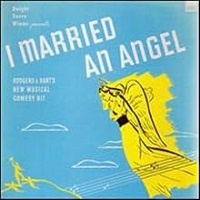 Original Broadway Cast Members and Radio Cast, 1985 (AEI Records)
Original Broadway Cast Members and Radio Cast, 1985 (AEI Records)  (4 / 5) I Married an Angel is a gem from the collection of Richard Rodgers and Lorenz Hart. Admittedly, it’s a slight musical; the plot concerns Count Willy Palaffi, who breaks off his engagement, stating that he will only “marry an angel.” Indeed, one flies down from heaven — complete with wings — and Willy learns to be careful what he wishes for. The only songs with a clear connection to the plot are the title song and “Angel Without Wings,” which consists mostly of rhyming dialogue. All the same, Rodgers and Hart supply a few lovely numbers that make this score a necessity for any musical theater fan. The highlight may be “A Twinkle in Your Eye,” a delightfully amoral ode to cheating and the ways that clever women can stay out of trouble, performed with vivacious flair by Wynn Murray. A wistful ballad, “Spring is Here,” also stands out, and it showcases the unique vocal quality of Eve Symington. The makeup of this album is unusual: It features six selections performed by members of the original Broadway cast and recorded by the Liberty Music Shop in 1938, plus a medley-cum-overture, played by popular pianists Cy Walter and Gil Bowers, that serves as the opening track. The five remaining numbers are taken from a 1952 radio production that starred the silver-voiced Gordon MacRae and the charming Lucille Norman. While both sets of excerpts are sung and orchestrated beautifully, this inconsistency makes the recording feel like it presents a series of musical vignettes rather than a complete score. But with music as good as this, why ask for anything more? — Charles Kirsch
(4 / 5) I Married an Angel is a gem from the collection of Richard Rodgers and Lorenz Hart. Admittedly, it’s a slight musical; the plot concerns Count Willy Palaffi, who breaks off his engagement, stating that he will only “marry an angel.” Indeed, one flies down from heaven — complete with wings — and Willy learns to be careful what he wishes for. The only songs with a clear connection to the plot are the title song and “Angel Without Wings,” which consists mostly of rhyming dialogue. All the same, Rodgers and Hart supply a few lovely numbers that make this score a necessity for any musical theater fan. The highlight may be “A Twinkle in Your Eye,” a delightfully amoral ode to cheating and the ways that clever women can stay out of trouble, performed with vivacious flair by Wynn Murray. A wistful ballad, “Spring is Here,” also stands out, and it showcases the unique vocal quality of Eve Symington. The makeup of this album is unusual: It features six selections performed by members of the original Broadway cast and recorded by the Liberty Music Shop in 1938, plus a medley-cum-overture, played by popular pianists Cy Walter and Gil Bowers, that serves as the opening track. The five remaining numbers are taken from a 1952 radio production that starred the silver-voiced Gordon MacRae and the charming Lucille Norman. While both sets of excerpts are sung and orchestrated beautifully, this inconsistency makes the recording feel like it presents a series of musical vignettes rather than a complete score. But with music as good as this, why ask for anything more? — Charles Kirsch
The Great Gatsby
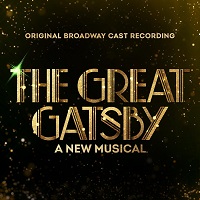 Original Broadway Cast, 2024 (Sony Masterworks Broadway)
Original Broadway Cast, 2024 (Sony Masterworks Broadway)  (0.5 / 5) As F. Scott Fitzgerald’s famous and revered novel The Great Gatsby lapsed into the public domain, it was perhaps inevitable that stage adaptations would begin to appear. This musical version had the good fortune of employing two extremely talented vocalists, Jeremy Jordan (Newsies, Bonnie and Clyde, etc. ) as Jay Gatsby and Eva Noblezada (Miss Saigon, Hadestown) as Daisy Buchanan. Noblezada was cast against type for this role, yet she comes across better than Jordan on the recording, finding genuine emotion in songs such as “For Better or Worse” and “Beautiful Little Fool.” Though Jordan’s singing voice is distinctive in ballads including “For Her,” his accent in his spoken dialogue sounds out of place. And while John Zdrojeski and Sara Chase are well cast as Tom Buchanan and Myrtle, respectively, Noah Ricketts struggles in the role of Nick. The story of Gatsby’s pursuit of the married Daisy is narrated in the novel and the musical by Nick, who has just returned home from serving in World War I, and who also plays a key role in the unfolding drama as he carries on a romance with professional golfer Jordan Baker (Samantha Pauly). Nick is the audience’s reporter on the show’s primary subjects and themes: the tragedy hidden behind the decadence of the Roaring ’20s in America, the life of the mysterious Gatsby, and the everlasting hope or the unreachable dream represented by a single green light in the distance. But narration is much more difficult to execute in a stage show than in a novel, and Nick’s lines often feel shoehorned into the musical. The score for this adaptation was written by Jason Howland (music) and Nathan Tysen (lyrics), and the book by Kait Kerrigan. Howland is not untalented; his melodies for the songs “For Her,” “Only Tea,” and “Past is Catching Up to Me” are enjoyable, and “My Green Light” plays well as the obligatory, highly-anticipated duet between the two leads. But some of Tysen’s lyrics are of shockingly poor quality. For example, in the song “One-Way Road,” a pregnant Myrtle sings “Though I’m not showing, a baby’s growing,” along with “He’s mine, and this baby here is genuine.” Lyrics like these prevent the recording from gaining any real momentum, and further, the score as a whole is structured so generically that some listeners may be able to predict the type and style of each successive song before it plays. Although the standout visuals of this show’s physical production and the presence of two bankable musical theater notables may keep the party moving well enough on stage, this Great Gatsby‘s lack of nuance is clear from the cast album, especially in comparison to the source material. — Forrest Hutchinson
(0.5 / 5) As F. Scott Fitzgerald’s famous and revered novel The Great Gatsby lapsed into the public domain, it was perhaps inevitable that stage adaptations would begin to appear. This musical version had the good fortune of employing two extremely talented vocalists, Jeremy Jordan (Newsies, Bonnie and Clyde, etc. ) as Jay Gatsby and Eva Noblezada (Miss Saigon, Hadestown) as Daisy Buchanan. Noblezada was cast against type for this role, yet she comes across better than Jordan on the recording, finding genuine emotion in songs such as “For Better or Worse” and “Beautiful Little Fool.” Though Jordan’s singing voice is distinctive in ballads including “For Her,” his accent in his spoken dialogue sounds out of place. And while John Zdrojeski and Sara Chase are well cast as Tom Buchanan and Myrtle, respectively, Noah Ricketts struggles in the role of Nick. The story of Gatsby’s pursuit of the married Daisy is narrated in the novel and the musical by Nick, who has just returned home from serving in World War I, and who also plays a key role in the unfolding drama as he carries on a romance with professional golfer Jordan Baker (Samantha Pauly). Nick is the audience’s reporter on the show’s primary subjects and themes: the tragedy hidden behind the decadence of the Roaring ’20s in America, the life of the mysterious Gatsby, and the everlasting hope or the unreachable dream represented by a single green light in the distance. But narration is much more difficult to execute in a stage show than in a novel, and Nick’s lines often feel shoehorned into the musical. The score for this adaptation was written by Jason Howland (music) and Nathan Tysen (lyrics), and the book by Kait Kerrigan. Howland is not untalented; his melodies for the songs “For Her,” “Only Tea,” and “Past is Catching Up to Me” are enjoyable, and “My Green Light” plays well as the obligatory, highly-anticipated duet between the two leads. But some of Tysen’s lyrics are of shockingly poor quality. For example, in the song “One-Way Road,” a pregnant Myrtle sings “Though I’m not showing, a baby’s growing,” along with “He’s mine, and this baby here is genuine.” Lyrics like these prevent the recording from gaining any real momentum, and further, the score as a whole is structured so generically that some listeners may be able to predict the type and style of each successive song before it plays. Although the standout visuals of this show’s physical production and the presence of two bankable musical theater notables may keep the party moving well enough on stage, this Great Gatsby‘s lack of nuance is clear from the cast album, especially in comparison to the source material. — Forrest Hutchinson
The Connector
 Original Off-Broadway Cast, 2024 (Concord Theatricals)
Original Off-Broadway Cast, 2024 (Concord Theatricals)  (3.5 / 5) Teeming with interesting ideas about ethics, journalism, the generation gap, and sexism, The Connector presents its audience with a key question: Would you rather read the facts, or the “truth?” Daisy Prince was a major creative force behind the show, which she directed Off-Broadway in early 2024. Jason Robert Brown provided the music and lyrics, and Jonathan Marc Sherman wrote the book. All three were inspired by the true stories of Stephen Glass and Jayson Blair, who respectively duped The New Republic and The New York Times into publishing articles that were partly fabricated or, in some cases, completely false. Ben Levi Ross leads the company as Ethan Dobson, the charismatic but duplicitous reporter at the center of the story, and his vocal talent is one of the greatest strengths of this recording. He is matched by Hannah Cruz in the role of Robin Martinez, a fellow journalist who quickly becomes suspicious of Ethan’s articles. Also on hand are stage veterans Scott Bakula and Jessica Molaskey, paired well with the newcomers. Bakula plays the jaded editor in chief of The Connector, and his wry rendition of the song “Now What?” reflects the divide between the older and younger generations; Molaskey is wonderful as the magazine’s longest-tenured fact checker, the first member of the staff to see through Ethan’s facade. In a humorous role, Max Crumm plays the subject of one of the fabricated articles, a West Village hustler whose game of choice is Scrabble. The show’s writers have given the cast powerful material in songs such as “Proof,” “The Western Wall,” and “There Never Was.” Brown’s score is appropriately varied and tuneful, and certainly reflective of the show’s setting in the 1990s; if it’s not as catchy as some of his previous work, his lyrics will be sure to stick with listeners and make them think. The final song is haunting as it derides the ethics of modern journalism and the gullible nature of the public with the searing line: “We believe what we believe, and all we want is someone to confirm it.” In the age of “fake news,” “alternative facts,” and unregulated online information sources, this recording is a timely listen. — Forrest Hutchinson
(3.5 / 5) Teeming with interesting ideas about ethics, journalism, the generation gap, and sexism, The Connector presents its audience with a key question: Would you rather read the facts, or the “truth?” Daisy Prince was a major creative force behind the show, which she directed Off-Broadway in early 2024. Jason Robert Brown provided the music and lyrics, and Jonathan Marc Sherman wrote the book. All three were inspired by the true stories of Stephen Glass and Jayson Blair, who respectively duped The New Republic and The New York Times into publishing articles that were partly fabricated or, in some cases, completely false. Ben Levi Ross leads the company as Ethan Dobson, the charismatic but duplicitous reporter at the center of the story, and his vocal talent is one of the greatest strengths of this recording. He is matched by Hannah Cruz in the role of Robin Martinez, a fellow journalist who quickly becomes suspicious of Ethan’s articles. Also on hand are stage veterans Scott Bakula and Jessica Molaskey, paired well with the newcomers. Bakula plays the jaded editor in chief of The Connector, and his wry rendition of the song “Now What?” reflects the divide between the older and younger generations; Molaskey is wonderful as the magazine’s longest-tenured fact checker, the first member of the staff to see through Ethan’s facade. In a humorous role, Max Crumm plays the subject of one of the fabricated articles, a West Village hustler whose game of choice is Scrabble. The show’s writers have given the cast powerful material in songs such as “Proof,” “The Western Wall,” and “There Never Was.” Brown’s score is appropriately varied and tuneful, and certainly reflective of the show’s setting in the 1990s; if it’s not as catchy as some of his previous work, his lyrics will be sure to stick with listeners and make them think. The final song is haunting as it derides the ethics of modern journalism and the gullible nature of the public with the searing line: “We believe what we believe, and all we want is someone to confirm it.” In the age of “fake news,” “alternative facts,” and unregulated online information sources, this recording is a timely listen. — Forrest Hutchinson
Lempicka
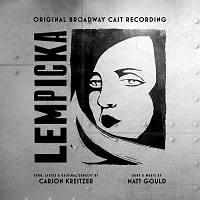 Original Broadway Cast, 2024 (Sony Masterworks Broadway)
Original Broadway Cast, 2024 (Sony Masterworks Broadway)  (1 / 5) Fans hailed Eden Espinosa’s return to Broadway in Lempicka and fawned over pre-released songs from the score, such as “Woman Is,”’ that showed off her powerful vocal instrument. Unfortunately, the show was a dud — an unfocused and unpleasant musical that appeared to be far more interested in the soap opera aspects of the title character’s life than her art. First-time listeners to this cast recording might be taken aback by the techno music and harsh orchestrations used in the overture, especially if they have any background knowledge about the show’s subject: Polish painter Tamara de Lempicka, whose most notable works were completed in the 1920s and ’30s in the Art Deco style, of which she was a pioneer. Composer Matt Gould seems to have written electronic music with rhythmic, focused beats for this score as a way of reflecting the hard-edged style of Lempicka’s art. Perhaps this is justifiable for the numbers in which Lempicka is learning to paint and developing her style, but as the show’s plot proceeds, and both her marriage and her extra-marital affair begin to fall apart, the emotional turmoil is accompanied by jarringly upbeat music more fit for a dance club. Espinosa impressively belts her way through the mediocre material, and two other pluses of the album are the textured, beautiful voices of Amber Iman and Andrew Samonsky as, respectively, Lempicka’s muse/lover and her husband, the latter doing his best with the show’s most poorly written character. These three share a love triangle that takes up most of the focus in the overstuffed plot and score. Lempicka closed very quickly on Broadway, and this recording seems unlikely to become a treasured cast album of a flop. A final note: Beth Leavel in the role of The Baroness gets one song here — the show’s 11 o’clock number, “Just This Way” — and she makes the most of it. — Forrest Hutchinson
(1 / 5) Fans hailed Eden Espinosa’s return to Broadway in Lempicka and fawned over pre-released songs from the score, such as “Woman Is,”’ that showed off her powerful vocal instrument. Unfortunately, the show was a dud — an unfocused and unpleasant musical that appeared to be far more interested in the soap opera aspects of the title character’s life than her art. First-time listeners to this cast recording might be taken aback by the techno music and harsh orchestrations used in the overture, especially if they have any background knowledge about the show’s subject: Polish painter Tamara de Lempicka, whose most notable works were completed in the 1920s and ’30s in the Art Deco style, of which she was a pioneer. Composer Matt Gould seems to have written electronic music with rhythmic, focused beats for this score as a way of reflecting the hard-edged style of Lempicka’s art. Perhaps this is justifiable for the numbers in which Lempicka is learning to paint and developing her style, but as the show’s plot proceeds, and both her marriage and her extra-marital affair begin to fall apart, the emotional turmoil is accompanied by jarringly upbeat music more fit for a dance club. Espinosa impressively belts her way through the mediocre material, and two other pluses of the album are the textured, beautiful voices of Amber Iman and Andrew Samonsky as, respectively, Lempicka’s muse/lover and her husband, the latter doing his best with the show’s most poorly written character. These three share a love triangle that takes up most of the focus in the overstuffed plot and score. Lempicka closed very quickly on Broadway, and this recording seems unlikely to become a treasured cast album of a flop. A final note: Beth Leavel in the role of The Baroness gets one song here — the show’s 11 o’clock number, “Just This Way” — and she makes the most of it. — Forrest Hutchinson
Disaster!
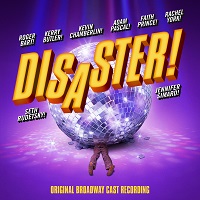 Original Broadway Cast, 2016 (Broadway Records)
Original Broadway Cast, 2016 (Broadway Records)  (4 / 5) As originally presented on the tiny stage of an intimate nightclub on the Upper West Side of Manhattan, Disaster! was a hilariously funny, spot-on spoof of both the epic disaster movies of the 1970s (The Poseidon Adventure, Earthquake, et al.) and the theatrical genre that has come to be known as “the jukebox musical,” in which pre-existing pop songs are shoved willy-nilly into a “plot” written around them. Sadly, the show had a very brief subsequent run on Broadway, where its intentionally bargain-basement production values were apparently not appreciated — this despite a cast that included such adept musical comedians as Roger Bart, Kerry Butler, Kevin Chamberlin, Faith Prince, Rachel York, and the brilliant Jennifer Simard in the scene-stealing role of a nun with a gambling addiction. But if that production couldn’t muster more than 104 performances in total, the cast album provides evidence that the show itself is a laugh riot and would likely be hugely popular with audiences if presented by community, regional, and summer theaters, high schools, and colleges. As set up in the opening number, “Hot Stuff,” the perfectly ridiculous story that Seth Rudetsky, Jack Plotnick, and Drew Geraci concocted to contain dozens of pop hits of the ’70s concerns a professor (Rudetsky) who attempts in vain to warn against an impending earthquake that threatens a floating casino/discotheque. Heard during the course of the loopy proceedings are such deathless songs as “Theme from Mahagony,” “Saturday Night,” “I Am Woman/That’s the Way I’ve Heard it Should Be,” “Never Can Say Goodbye,” “Feelings,” “Three Times a Lady,” “Don’t Cry Out Loud,” and about 20 others — but, cannily, almost none of these are performed complete. Rather, they stick around just long enough to make their comic and nostalgic points, then disappear back into the musical ether. If we can all agree that the highlight of the album is Simard’s magnificently toneless rendition of “The Lord’s Prayer” (remember that one?!), there are many other musically and/or comically excellent tracks here, featuring the personnel named above as well as such other worthies as Adam Pascal, Max Crumm, Manoel Felciano, Lacretta Nicole, Paul Castree, and the budding young talent Baylee Littrell in the dual role of 11-year-old twins Ben and Lisa. Throughout, the sounds of the ’70s are expertly aped by orchestrators/arrangers Joseph Joubert and Seth Rudetsky (wearing yet another hat), vocal arranger Michael McElroy, and dance arranger David Dabbon, all under the crack musical direction of Steve Marzullo. Party on! — Michael Portantiere
(4 / 5) As originally presented on the tiny stage of an intimate nightclub on the Upper West Side of Manhattan, Disaster! was a hilariously funny, spot-on spoof of both the epic disaster movies of the 1970s (The Poseidon Adventure, Earthquake, et al.) and the theatrical genre that has come to be known as “the jukebox musical,” in which pre-existing pop songs are shoved willy-nilly into a “plot” written around them. Sadly, the show had a very brief subsequent run on Broadway, where its intentionally bargain-basement production values were apparently not appreciated — this despite a cast that included such adept musical comedians as Roger Bart, Kerry Butler, Kevin Chamberlin, Faith Prince, Rachel York, and the brilliant Jennifer Simard in the scene-stealing role of a nun with a gambling addiction. But if that production couldn’t muster more than 104 performances in total, the cast album provides evidence that the show itself is a laugh riot and would likely be hugely popular with audiences if presented by community, regional, and summer theaters, high schools, and colleges. As set up in the opening number, “Hot Stuff,” the perfectly ridiculous story that Seth Rudetsky, Jack Plotnick, and Drew Geraci concocted to contain dozens of pop hits of the ’70s concerns a professor (Rudetsky) who attempts in vain to warn against an impending earthquake that threatens a floating casino/discotheque. Heard during the course of the loopy proceedings are such deathless songs as “Theme from Mahagony,” “Saturday Night,” “I Am Woman/That’s the Way I’ve Heard it Should Be,” “Never Can Say Goodbye,” “Feelings,” “Three Times a Lady,” “Don’t Cry Out Loud,” and about 20 others — but, cannily, almost none of these are performed complete. Rather, they stick around just long enough to make their comic and nostalgic points, then disappear back into the musical ether. If we can all agree that the highlight of the album is Simard’s magnificently toneless rendition of “The Lord’s Prayer” (remember that one?!), there are many other musically and/or comically excellent tracks here, featuring the personnel named above as well as such other worthies as Adam Pascal, Max Crumm, Manoel Felciano, Lacretta Nicole, Paul Castree, and the budding young talent Baylee Littrell in the dual role of 11-year-old twins Ben and Lisa. Throughout, the sounds of the ’70s are expertly aped by orchestrators/arrangers Joseph Joubert and Seth Rudetsky (wearing yet another hat), vocal arranger Michael McElroy, and dance arranger David Dabbon, all under the crack musical direction of Steve Marzullo. Party on! — Michael Portantiere
Suffs
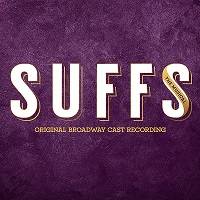 Original Broadway Cast, 2024 (Atlantic)
Original Broadway Cast, 2024 (Atlantic)  (4 / 5) Shaina Taub has previously shown talent and skill in composing scores for and playing featured roles in The Public Theater’s musical adaptations of Shakespeare’s Twelfth Night and As You Like It. With Suffs, Taub has not only written the book, music, and lyrics for the show, but she stars in it as well. This recording showcases her refreshingly intelligent score from start to finish. Songs such as “Worth It” and “This Girl” are not empty ballads; they have lyrics that probe and explore the characters’ thoughts and feelings thoroughly, without a slant rhyme to be heard. The group numbers are equally thrilling as they present the titular “suffs” — suffragists fighting for the voting rights of women from roughly 1913 to 1920. Taub is joined in the all-female cast by Nikki M. James, Jenn Colella, Ally Bonino, Hannah Cruz, Grace McLean, Emily Skinner (somewhat disappointingly underused in two small roles), and too many others to name. James is searing in her first act solo, “Wait My Turn,” and Cruz and Bonino in their featured moments add an endearing quality to the fiery group of women. Grace McLean is perhaps a bit campy while playing President Woodrow Wilson, but does represent a suitably frustrating obstacle for the suffs to overcome. The standout performance on the recording is from Colella as Carrie Catt, a more moderate suffragist who acts as a foil to Shaina Taub’s character, the relentless Alice Paul. Their characters’ vocal slugfest during the convention sequence is musical theater gold. In this age of homogenized vocals and auto-tune, this recording deserves praise for basking in the distinctive and unique voices of its performers. Two quibbles keep the album from being absolutely top-notch. First, the women in the show are so singular in their passion to win the vote that the story and songs fall into a rather predictable pattern. There is a rally, a setback, and then resilience, which leads to another rally, another setback — and so on. Secondly, the fact that there are so many historical figures portrayed in the show means that sometimes the listener is treated to Wikipedia-like summaries of their biographies. But these quibbles aside, Suffs is a highly recommended recording for the merits of its excellent score and stellar cast. — Forrest Hutchinson
(4 / 5) Shaina Taub has previously shown talent and skill in composing scores for and playing featured roles in The Public Theater’s musical adaptations of Shakespeare’s Twelfth Night and As You Like It. With Suffs, Taub has not only written the book, music, and lyrics for the show, but she stars in it as well. This recording showcases her refreshingly intelligent score from start to finish. Songs such as “Worth It” and “This Girl” are not empty ballads; they have lyrics that probe and explore the characters’ thoughts and feelings thoroughly, without a slant rhyme to be heard. The group numbers are equally thrilling as they present the titular “suffs” — suffragists fighting for the voting rights of women from roughly 1913 to 1920. Taub is joined in the all-female cast by Nikki M. James, Jenn Colella, Ally Bonino, Hannah Cruz, Grace McLean, Emily Skinner (somewhat disappointingly underused in two small roles), and too many others to name. James is searing in her first act solo, “Wait My Turn,” and Cruz and Bonino in their featured moments add an endearing quality to the fiery group of women. Grace McLean is perhaps a bit campy while playing President Woodrow Wilson, but does represent a suitably frustrating obstacle for the suffs to overcome. The standout performance on the recording is from Colella as Carrie Catt, a more moderate suffragist who acts as a foil to Shaina Taub’s character, the relentless Alice Paul. Their characters’ vocal slugfest during the convention sequence is musical theater gold. In this age of homogenized vocals and auto-tune, this recording deserves praise for basking in the distinctive and unique voices of its performers. Two quibbles keep the album from being absolutely top-notch. First, the women in the show are so singular in their passion to win the vote that the story and songs fall into a rather predictable pattern. There is a rally, a setback, and then resilience, which leads to another rally, another setback — and so on. Secondly, the fact that there are so many historical figures portrayed in the show means that sometimes the listener is treated to Wikipedia-like summaries of their biographies. But these quibbles aside, Suffs is a highly recommended recording for the merits of its excellent score and stellar cast. — Forrest Hutchinson
Here We Are
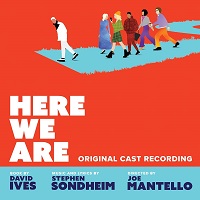 Off-Broadway Cast, 2024 (Concord Theatricals)
Off-Broadway Cast, 2024 (Concord Theatricals)  (4.5 / 5) As staged Off-Broadway at The Shed in late 2023, Sondheim’s final musical — which combines two Luis Buñuel films to create one story about a group of wealthy friends who struggle all day to find a place to eat and then can’t leave the room — offered strange, surreal satisfaction. The cast album of Here We Are captures the show’s bizarreness while still showcasing the small-scale treasures of Sondheim’s last songs. The wise inclusion on the recording of significant patches of David Ives’ book scenes (there is very little music in the second act) helps to capture the show’s shifting flavors, even if parts of the story will likely remain inscrutable to some listeners. Sondheim’s music sometimes goes beyond evoking his past work; certain sections seem to quote Passion and Sunday in the Park with George outright. But there are worse things than revisiting some of his most wistful melodic gestures, and there are moments in this score that suggest a self-referential wink, too. His lyrics remain outstandingly specific to character in their rhythms, vocabulary, and grammar, particularly in the comic “Bishop’s Song” for a character (played by David Hyde Pierce) who would rather be working in another field, and in the show’s most glistening addition to the canon, the aria “Shine” for Marianne (Rachel Bay Jones). “I want things to gleam / To be what they seem / And not what they are,” she sings in one of Sondheim’s last perfect constructions. It’s not his most densely rhymed score, nor his most unimpeachable; for example, a parodically mournful ballad, “It Is What It Is,” for Tracie Bennett (doing a ridiculous French accent), misfires on the recording as it did onstage. But Sondheim clearly relishes the unique weirdnesses of each of his characters, and sometimes gives them notably lush, romantic melodies as in “The Soldier’s Dream,” sung brightly by Jin Ha and Micaela Diamond. (The most frustrating aspect of the album is how often the richest music is interrupted by spoken asides referencing stage business by other characters, doing little to clarify or enrich those moments.) While Here We Are is a true ensemble piece, Jones is especially delightful in animating Marianne’s willful ignorance masquerading as innocence, and lovely as she sounds when singing, it’s the recorded book scenes that demonstrate the complexities she squeezes out of a defiantly superficial character, as when she makes a meal out of delicious consonants in sultry, silly lines such as “I found you a credenza for your embassy.” Perhaps more than anything else, this score in album form is a testament to the 50-year-plus collaboration between orchestrator Jonathan Tunick and Sondheim. The recording not only exquisitely communicates Tunick’s sumptuous, quirky, and always dramatically motivated treatment of Sondheim’s compositions but also demonstrates, through the inclusion of several Act II interludes and the substantial, shimmering exit music, how lovingly Tunick developed those melodies in instrumental sections presumably constructed after Sondheim’s death. (The entr’acte, for instance, fleshes out a gorgeous, brief melody sung by Steven Pasquale in “The Road 4 — Part 2.”) When it comes to that partnership, to quote Marianne, “Don’t we all feel blessed?” — Dan Rubins
(4.5 / 5) As staged Off-Broadway at The Shed in late 2023, Sondheim’s final musical — which combines two Luis Buñuel films to create one story about a group of wealthy friends who struggle all day to find a place to eat and then can’t leave the room — offered strange, surreal satisfaction. The cast album of Here We Are captures the show’s bizarreness while still showcasing the small-scale treasures of Sondheim’s last songs. The wise inclusion on the recording of significant patches of David Ives’ book scenes (there is very little music in the second act) helps to capture the show’s shifting flavors, even if parts of the story will likely remain inscrutable to some listeners. Sondheim’s music sometimes goes beyond evoking his past work; certain sections seem to quote Passion and Sunday in the Park with George outright. But there are worse things than revisiting some of his most wistful melodic gestures, and there are moments in this score that suggest a self-referential wink, too. His lyrics remain outstandingly specific to character in their rhythms, vocabulary, and grammar, particularly in the comic “Bishop’s Song” for a character (played by David Hyde Pierce) who would rather be working in another field, and in the show’s most glistening addition to the canon, the aria “Shine” for Marianne (Rachel Bay Jones). “I want things to gleam / To be what they seem / And not what they are,” she sings in one of Sondheim’s last perfect constructions. It’s not his most densely rhymed score, nor his most unimpeachable; for example, a parodically mournful ballad, “It Is What It Is,” for Tracie Bennett (doing a ridiculous French accent), misfires on the recording as it did onstage. But Sondheim clearly relishes the unique weirdnesses of each of his characters, and sometimes gives them notably lush, romantic melodies as in “The Soldier’s Dream,” sung brightly by Jin Ha and Micaela Diamond. (The most frustrating aspect of the album is how often the richest music is interrupted by spoken asides referencing stage business by other characters, doing little to clarify or enrich those moments.) While Here We Are is a true ensemble piece, Jones is especially delightful in animating Marianne’s willful ignorance masquerading as innocence, and lovely as she sounds when singing, it’s the recorded book scenes that demonstrate the complexities she squeezes out of a defiantly superficial character, as when she makes a meal out of delicious consonants in sultry, silly lines such as “I found you a credenza for your embassy.” Perhaps more than anything else, this score in album form is a testament to the 50-year-plus collaboration between orchestrator Jonathan Tunick and Sondheim. The recording not only exquisitely communicates Tunick’s sumptuous, quirky, and always dramatically motivated treatment of Sondheim’s compositions but also demonstrates, through the inclusion of several Act II interludes and the substantial, shimmering exit music, how lovingly Tunick developed those melodies in instrumental sections presumably constructed after Sondheim’s death. (The entr’acte, for instance, fleshes out a gorgeous, brief melody sung by Steven Pasquale in “The Road 4 — Part 2.”) When it comes to that partnership, to quote Marianne, “Don’t we all feel blessed?” — Dan Rubins
